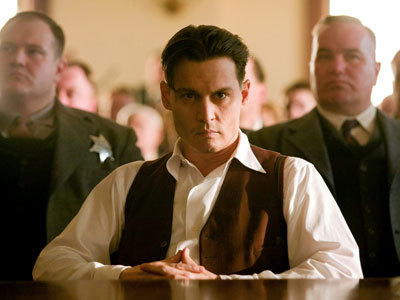
Public Enemies is not, as I was informed the day that I saw it, "the worst movie everâ€. It's not a particularly good movie, but it's not a bad movie. The most accurate word for Public Enemies is "flatâ€. In a few more words, I would go on to describe the cinematography as "extreme close up HD shaky camâ€. One of the best things that Spielberg, for example, does in his treatment of period film is to make them feel as if they were made in the time they're set; Munich, despite whatever else you might say about it, felt like a seventies film.
While there are obvious aesthetic and practical considerations to take into account in the making of a period piece set in the twenties (Clint Eastwood did a pretty good job in Changeling), Michael Mann's choice to shoot Public Enemies in HD and with such proximity to the actors divorces the film from the audience. Alienating the audience with cinematography is not a good idea when you've chosen to tell an interesting story in an unengaging fashion, eking flat characterisation out of normally talented actors.
Public Enemies had the chance to have it all: bank robberies! Johnny Depp! Style! Panache! It's not dull and it's not a bad movie, but it simply doesn't work. It's a movie that asks its audience to sit there and watch for two and a half hours. Their eyes won't slide off the screen, but will they give a damn about what they're seeing? It would be a tough gambit for the studios, but this is a movie where the poster is better than the finished product; good promotion and a good cast will carry it so far, but how will it fare on word of mouth here in Australia?
John Dillinger (Johnny Depp) is a bank robber. J. Edgar Hoover (Billy Crudup) does not approve of his shenanigans, and so sets Melvin Purvis (Christian Bale) after him. Dillinger falls in love with Billie Frechette (Marion Cotillard), and that's the situation for two and a half hours: a few bank robberies, a prison break or two, some attempts to catch Dillinger, and the end. Oh yeah, also there's some brutalisation of women in there, which is always fun to watch.
It sounds like it could have been great: cat and mouse between Dillinger and the FBI, some legitimate romance between Dillinger and Billie, all narrated by David Wenham wearing an eye patch. It was not to be. Bale and Depp disappointingly phone in their performances as mere outlines of characters. Whether we're supposed to find them sympathetic, if we're supposed to root for one or the other, is never a matter for consideration: they're just a couple of guys at whom a camera is pointed. Cotillard's accent isn't strictly consistent and her romance is in the most basic terms of Dillinger telling her "you're my lady†and her acquiescing after putting up a weak fight.
There’s not much more to say about it outside of what it could have been. The only exciting part – Giovanni Ribisi’s plan for a train robbery – is quashed by the movie’s interest in historical accuracy. This would have been acceptable had Mann played to the strengths of the story, rather than mastering the art of making prison breaks and bank heists dull, rendering Baby Face Nelson the most annoying crook in history, and producing a long list of supposedly important fellow bank robbers who one would be hard pressed to remember the names of.
Dillinger is not a loveable rogue; Purvis is nothing but a cut out. The brutalisation of women is supposed to be horrifying but you get the impression that nobody cares. There is a glimmer of ambiguity and moral questioning in the climax, but it fades almost as quickly as it arises.
The epilogue text is criminally dishonest and reductive, and one is forced to believe that if Mann and his cast didn’t care, why the hell should we?
This is cinema at a remove. You can’t get close to Dillinger, but you won’t want to; at the end you'll dust your hands off and go home. That’s all you can do when confronted with the vacuum created by films like Public Enemies.


um. I think I figured out what the worst movie ever is, in my opinion. Did I tell you already? I can’t remember. Anyways, I think it is…
POOTIE TANG.